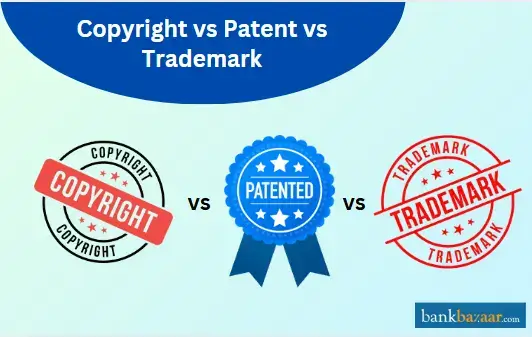Trademark vs Copyright vs Patent
In the world of intellectual property (IP), trademarks, copyrights, and patents are essential tools that protect different types of creative and business assets. While they may seem similar, each serves a distinct purpose. Understanding the differences can help you safeguard your ideas and innovations effectively.
What is a Trademark?
A trademark is a recognizable sign, design, or expression that distinguishes a product or service from others in the market. It helps businesses build brand identity and customer trust.
Examples of Trademarks
- Logos (e.g., Nike Swoosh, Apple logo)
- Brand names (e.g., Coca-Cola, McDonald's)
- Slogans (e.g., "Just Do It")
- Unique packaging or product designs (e.g., the shape of a Coca-Cola bottle)
Benefits of Registering Trademarks
- Legal protection against unauthorized use
- Establishes brand credibility and recognition
- Grants exclusive rights to use the mark in commerce
- Can increase business valuation and revenue
Trademark Validity Period
A trademark can last indefinitely as long as it is actively used and renewed periodically (typically every 10 years, depending on jurisdiction).
Who Should Apply for a Trademark?
- Business owners
- Brand developers
- Entrepreneurs launching unique products/services
- Companies looking to protect brand identity
What is Copyright?
Copyright protects original works of authorship, including literary, artistic, and musical creations. It grants creators exclusive rights to use, reproduce, and distribute their work.
Examples of Copyrighted Works
- Books and articles
- Music and lyrics
- Films and TV shows
- Paintings and photographs
- Software code
Duration of Copyright
Copyright protection generally lasts for the lifetime of the creator plus an additional 50 to 100 years, depending on the country.
Who Should Apply for Copyright?
- Writers, authors, and bloggers
- Musicians, filmmakers, and photographers
- Artists and graphic designers
- Software developers
What is a Patent?
A patent is an exclusive right to inventors, giving the patent owner the legal authority to prevent others from making, using, or selling the invention without permission.
Examples of Patented Inventions
- Pharmaceutical drugs (e.g., COVID-19 vaccines)
- Technological innovations (e.g., touchscreen technology)
- Industrial machines and equipment
- New chemical compositions
Types of Patents
- Utility Patent: Covers new inventions and processes.
- Design Patent: Protects the unique design of a product.
- Plant Patent: Covers new plant varieties created through asexual reproduction.
Who Should Apply for a Patent?
- Inventors
- Research and development firms
- Tech startups
- Pharmaceutical companies
Key Differences Between Trademark, Copyright, and Patent

Feature | Trademark | Copyright | Patent |
Purpose | Protects brand names, logos, and slogans | Protects original creative works | Protects new inventions and innovations |
Scope | Prevents others from using similar branding | Prevents unauthorized reproduction | Prevents others from making, using, or selling the invention |
Duration | Renewable every 10 years | Life of the creator + 50-100 years | 20 years (utility patent) |
Enforcement | Through trademark litigation | Through copyright infringement claims | Requires patent litigation |
How to Choose the Right Protection for Your IP
- Use trademarks to protect brand identity.
- Use copyrights to safeguard original creative works.
- Use patents to secure exclusive rights to inventions.
- Consult an IP attorney for complex cases.
Common Myths and Misconceptions About IP
- A trademark, copyright, and patent are the same. (False - Each serves a different purpose.)
- You must register a copyright to get protection. (False - Copyright exists automatically upon creation.)
- Trademarks expire permanently after 10 years. (False - They can be renewed indefinitely.)
- Patents last forever. (False - Most patents last for 20 years.)
- You can patent an idea. (False - Only tangible inventions can be patented.)
Final Conclusion
Understanding the differences between trademarks, copyrights, and patents is crucial for protecting intellectual property. Whether you're a business owner, creator, or inventor, choosing the right type of protection ensures your assets remain secure. Consider consulting an expert to navigate IP laws effectively.
FAQs on Trademark vs Copyright vs Patent
- What is the main difference between trademark, copyright, and patent?
Trademarks protect brand identity, copyrights cover creative works, and patents secure inventions.
- Do I need to register a trademark or copyright to get protection?
Copyright exists automatically, but trademarks require registration for full legal protection.
- How long does a patent last?
Utility patents last 20 years, while design patents last 15 years.
- Can I copyright my business name?
No, business names fall under trademark protection.
- Can I trademark a slogan?
Yes, if it uniquely identifies your brand.
- What happens if someone infringes my patent?
You can file a lawsuit for patent infringement.
- Can a trademark be renewed indefinitely?
Yes, as long as it is actively used and renewed every 10 years.
- What types of works are not protected by copyright?
Ideas, facts, and common knowledge are not copyrighted.
- Can I get both copyright and trademark protection for a logo?
Yes, logos can qualify for both.
- What is the cost of registering a trademark, copyright, or patent?
Costs vary depending on jurisdiction and complexity, but trademarks and copyrights are generally cheaper than patents.

Disclaimer
Credit Card:
Credit Score:
Personal Loan:
Home Loan:
Fixed Deposit:
Copyright © 2026 BankBazaar.com.